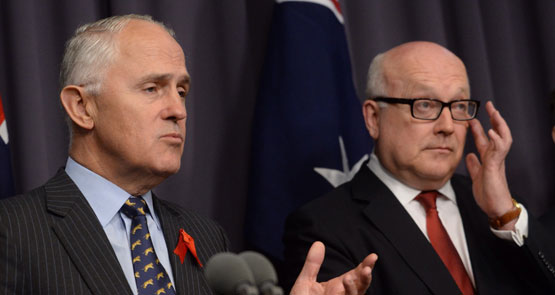
Coincidence or not the Turnbull has chosen just the moment when Labor is flailing over allegations of improper connections with a Chinese billionaire to introduce new laws dealing with political donations and espionage.
Against the background of continuing political fallout for Labor Senator Sam Dastyari over inappropriate dealings with a Chinese political donor, the government has unveiled two sets of legislation that seek to address concerns about the source of political donations and attempts to influence the political process.
What is not clear is whether these pieces of legislation have been hastily brought forward to take advantage of the Dastyari affair. This will be tested when these laws are debated in parliament in the new year.
Central to the new legislation will be a law that makes it a criminal offence for a foreign entity or its representatives to interfere in Australian politics.
“If you act covertly on behalf of a foreign actor, in a way that harms Australia’s national security, to influence the political process, or a government decision, that conduct will be criminalised,’’ Attorney-General George Brandis said.
It remains to be seen how such a broad-ranging measure would be prosecuted. It aims to shield Australia from the sort of interference that is bedeviling other Western democracies.
The government is making no secret of having drawn lessons from the United States in drafting its legislation, including experiences during the 2016 presidential election.
In another important component of the legislation aimed at combating foreign influence, it will be an offence not simply to communicate sensitive information, but to possess such information gained improperly.
In the other tranche of legislation announced yesterday, the government will ban all foreign donations to political parties, and those organisations like the progressive lobbying group GetUp, which seek to influence the political process.
Again, the government will face challenges defining exactly which groups are engaged in influencing the political process on left and right, and their sources of funding.
Finally, the requirement for lobbyists operating on behalf of foreign entities to register should be regarded as a welcome development. Such lobbyists, including former Trade Minister Andrew Robb who represents a Chinese company, will now find themselves on the public record.







I heard the new Senator replacing Nick Xenaphon talking about another US style innovation and that is an Intelligence Oversight Committe of sorts. I wonder why he reckons we might need that all of a sudden. Perhaps it’s because directly or indirectly collected intelligence has just been manipulated by lnp surrogates in Newspapers to effect a bi-election that will have implications for the future of the whole government. All the Senators should worry about this sort of stuff.
I wonder whether News Ltd would count as a foreign influence?
Haha. Good point!
They will be after Crikey next.
He didn’t have anything more recent to dig up, to play with : to use as a distraction?
As for “a criminal offence for a foreign entity or its representatives to interfere in Australian politics”- aimed as much at GetUp! as anything?
I’m the first to admit I’m not the sharpest knife in the block and for the life of me I can’t think of any reason, for :-
“singling out GetUp! : and not US Citizen Murdoch’s owned News Corpse” for targetting, for condemnation for interfering with our democratic process, beyond sheer bloody-minded hypocrisy from this arrogant supercilious born-to-rule mob?
A foreign owned media empire with it’s “70”% share of our print news, to go with FUX? An entity devoted to fiddling with factoids, and limited disclosure – to influence the perceptions of voters re “fitness to govern” with a view to influencing electoral outcomes – 353.25 daze/year?
While the NBN (a competitor to Rupert’s entertainment media circus) was emasculated?
Then there was that overhaul of X-media ownership – that suited Rupert again?
And those sort of costs don’t amount to “interfering in Australian politics”?
That that’s “different” because Turnbull-Brandis say it is?
…… Anyone else any other ideas as to why they’d do this?
And if you check the latest Quarterly essay, you could easily conclude that Dastyari was going about China dealings in the right way (more or less), while the LNP are probably flogging a dead horse sucking up to Trump.
China will win, the USA will lose, no matter what Murdoch and the IPA believe.
Sorry that’s “363.25 daze/year” of course.
What exactly are the “lessons drawn from the US experiences during the 2016 election”? You are surely not referring to the canard of the “Russians did it” when all the evidence points to the fact that if there was any foreign interference with the US election it was by Israel, not Russia.
Of course, Israeli and US interference with our election process is something that is not to be mentioned in the msm. Quite apart from financial contributions, just count up the number of our MPs and Senators that have made trips (all expenses paid) to that little troublemaking country.
The proposed legislation is incredibly dangerous in its scope. Yet again Australia is sleepwalking into a fascist state, to add to the torrent of laws passed since 9/11, all justified on grounds of ‘national security’ and nary a constitutional protection in sight to provide any redress.